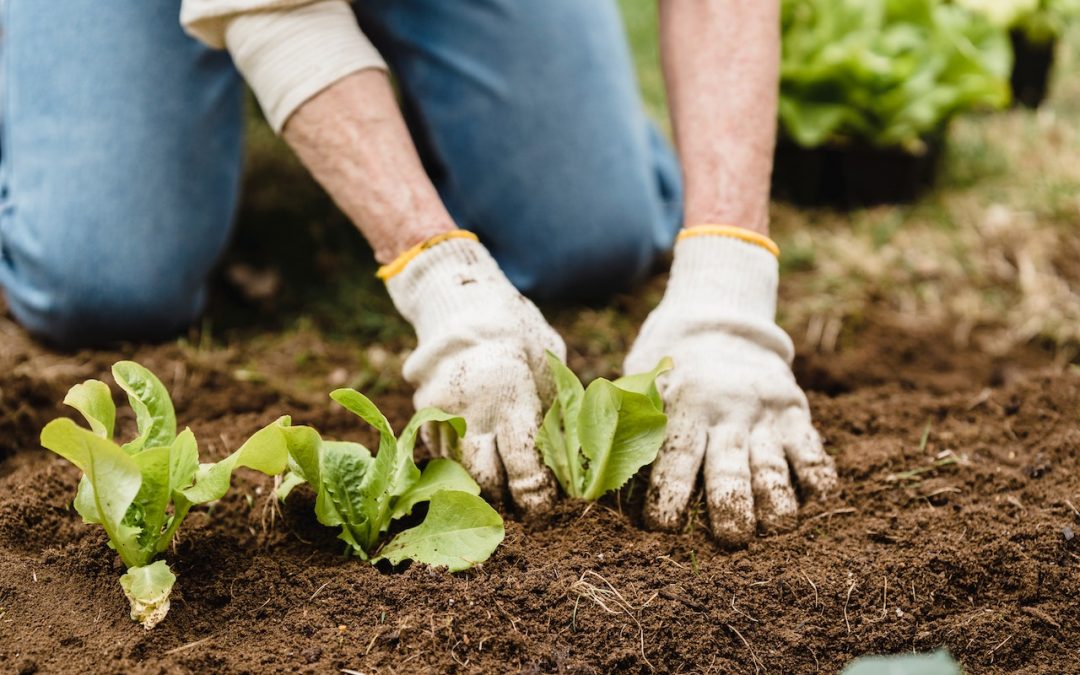The CDC reports the average American has traces of at least 29 different pesticides in their bodies.
Find out why you should choose organic vs synthetic fertilizer, other outdoor toxins that contribute to health issues, and solutions.
I don’t know how much time you spend out in your yard, but I love being outside and walking barefoot through the grass in the warmer months. I also enjoy yard games, grilling out, and doing some raking or gardening. Do you spend a lot of time in your yard? If not, you might have kids or pets running around playing in the yard and you know they can get into all kinds of stuff. They can also bring that stuff in with them on their shoes, hands, or paws. You don’t want those pesticides in your home! Or maybe your kids are eating foods before washing their hands after being in a pesticide grass? What about eating pesticide foods from the garden? Or just breathing them in instead. Or all of the above!
Just a Reminder: Blog does contain Affiliate links. If you buy something, I’ll possibly make a small commission from it, but at no additional cost to you.
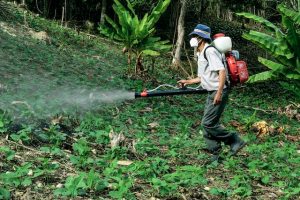 Pesticides are One of the Most Dangerous Toxins
Pesticides are One of the Most Dangerous Toxins
Not too long ago, CDC found toxic weedkiller in 87 percent of 650 children tested! They had detectable levels of toxic herbicide glyphosate in their urine.
The federal health agency also tested more than 1,600 urine samples of adults and found 80 percent had detectable levels of the weedkiller (Formuzis, 2022).
In 2018 and 2019, juries in three separate cases found that glyphosate causes cancer and that Monsanto covered up evidence of its health risk for decades (Formuzis, 2021). The company did just recently claim they will stop using glyphosate in weedkiller for lawns and garden starting in 2023, but did not comment on the replacement. Do we trust they will choose a suitable, safe replacement? I’m not feeling optimistic about it.
Pesticides are linked to cancer, reproductive damage, Alzheimer’s Disease, Parkinson’s Disease, respiratory problems, depression, ADHD, immune system damage, and birth defects. They can also cause damage to your nervous system, endocrine system, and reproductive system.
Live Near a Factory or a Farm?
There are many instances of chronic respiratory and other health conditions from living near a factory or farmland just from inhaling the chemicals on a regular basis. Studies have shown people who live near farmland where they spray pesticides have larger traces in their bodies than those who don’t live near farmland. There are also many reports of pesticides ending up in people’s water supply and causing people to develop chronic health conditions.
Illnesses occurring at higher rates for people living close to agriculture include birth defects, brain cancer, autism, infertility, miscarriage, Parkinson’s Disease, immune system damage, leukemia, developmental brain damage in children, higher rates of child cancers, non-Hodgkin’s lymphoma, autoimmune disorders, arthritis, lupus and diabetes (Chem-Tox, 2018). Here is an in-depth review on this.
Avoiding Pesticides in Your Food
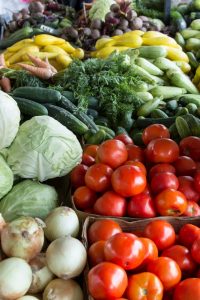 I talked a bit about this in a former blog, Organic vs Natural. I talk about the standards for food being labeled organic. Here are some of the organic guidelines: they can’t use toxic, synthetic pesticides, herbicides, or fertilizers, only natural products – which must pass approval, no GMO’s, and no artificial flavors, colors, or preservatives.
I talked a bit about this in a former blog, Organic vs Natural. I talk about the standards for food being labeled organic. Here are some of the organic guidelines: they can’t use toxic, synthetic pesticides, herbicides, or fertilizers, only natural products – which must pass approval, no GMO’s, and no artificial flavors, colors, or preservatives.
Then, in a following blog I talk about When is Organic Really Worth it? In that blog I mention utilizing the Dirty Dozen List created by the EWG if you can’t afford to buy all your fruits and vegetables organically. Also, if you purchase from local farmers even if they are not organic, they typically have less pesticides than commercial products. It is also advised to choose fruits and vegetables that are in season to keep your costs down.
View my blog for more tips on when to eat organic, the amount of pesticides found in foods like strawberries, learning about EWG, and how to make changes slowly.
Do you plant your own garden?
There are many tricks to keep pests away without using pesticides, you just need to do a bit of research. One idea is to: Make A Stink: Many aromatic herbs, like yarrow, citronella, mint, fennel, catnip, basil, and lemongrass are natural deterrents for garden pests from aphids to potato beetles (Francis). For many ideas check out this article on HGTV.
We did a garden not too long ago and planted some basil around our tomatoes and not only did it help to keep pests away, but it actually added some nice flavor to our cherry tomatoes. They are still today the best I have ever tasted. Although, the taste likely has to do with the type of cherry tomatoes, gardening conditions, and the fact that they are organic, as well.
Choose Natural Plant Fertilizers
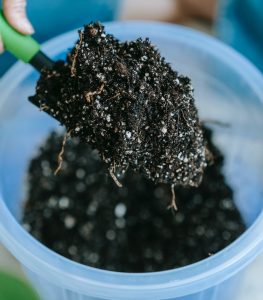 Synthetic fertilizers are actually pretty new, they were introduced during the “Green Revolution” between 1950-1970. A revolution that was not what we currently refer to as “green.” No not “environmentally friendly.”
Synthetic fertilizers are actually pretty new, they were introduced during the “Green Revolution” between 1950-1970. A revolution that was not what we currently refer to as “green.” No not “environmentally friendly.”
Chemicals like Miracle-Gro urea-based fertilizer have since been found to kill soil microbes and cause loads of other problems in the environment and human health (Hailey, 2022). It contains ammonium sulfate. Many of the popular fertilizer products I’ve looked at contain ammonium sulfate, which can cause respiratory problems and is harmful to the skin. It contains a toxic gas that damages the lungs. Then there is also nitrogen, which can lead to problems with reproductive organs, the urinary system, and more. But that’s not all! You are exposed to heavy metals such as arsenic, mercury, and lead.
Synthetic fertilizers also damage the natural ecosystem. They do not improve the health of plants. Short-term they may help, but long term they destroy the health of the soil and the plants. In the Gulf of Mexico there is an area called the DeadZone where nothing grows but algae because of all the synthetic fertilizer runoff from Midwest farmland.
Look for fertilizers that are organic and better yet have the OMRI (Organic Materials Review Institute) Approved for Organic Production seal. Learn a bit more about this and some fertilizer options on All About Gardening.
Want a natural weed killer? Try using 44-50% vinegar with equal parts water, and for stubborn weeds just use straight vinegar. Note: This will kill your grass, it kills all plants.
Ever buy mulch?
There is really no reason to. You can ask tree care services for mulch, many cities have a free program where you can pick some up, you can collect backyard leaves, utilize grass clippings, create compost, utilize pine needles, or even straw. Chemicals in mulch can harm the soil, harm your plants, and the ecosystem in general.
Keeping Pests Out of Your Home Naturally
My Ant Infestation
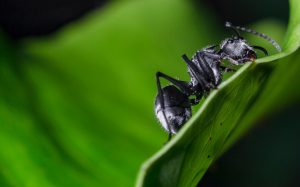 Not too long ago in our old house we had an ant problem, and I’m not talking about those tiny ants that show up in a small corner space. I’m talking about full size ants that were showing up in our hallway, living room, dinning room, and at one point the bathroom. This is literally across the house. There was no clear sign as to where they were coming from.
Not too long ago in our old house we had an ant problem, and I’m not talking about those tiny ants that show up in a small corner space. I’m talking about full size ants that were showing up in our hallway, living room, dinning room, and at one point the bathroom. This is literally across the house. There was no clear sign as to where they were coming from.
We thought about calling for people to come spray, and there was an option for people to come with natural sprays that are essential oil based. But it is so expensive. So anyway, just a bit of research and I found Wondercide!
You just attach it to your garden hose and spray the outside of your house. We did this a 2-3 times over the course of a week and the ants completely disappeared. We ended up buying two, but I think we only used half of the second one. It takes minutes, we didn’t have to bother with scheduling time with a professional, its natural and safe for our health, and so much cheaper!
It works for mosquitos, ants, as a general insect repellent, treatment, and killer. Plus, it is safe for pets, plants, and kids.
There is also one for fleas and ticks!
We also have made a special mixture that can be used for practically all bugs!
Use a 2 gallon sprayer. Fill with water, 6 TBSP baking soda, 2 TBSP peppermint oil and 2 TBSP dish soap. It is supposed to work well for most pests.
Other Considerations
If you wash your car yourself, consider getting a more natural car washing product as some of the chemicals may leach into the soil and stick around for awhile.
Avoid bug spray products that contain DEET or other toxic chemicals. I actually just purchase my bug spray from my local farmer’s market and get something with essential oils. It actually smells good!! AND it doesn’t leave you with that yucky feeling on your skin. Although they are generally safer, you can have allergic reactions to essential oils. So make sure to do a spot test on your skin before spraying significant amounts on your body.
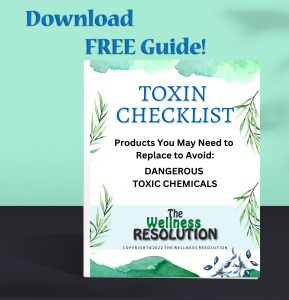
Download this Free Guide:
TOXIN CHECKLIST
(Products to Replace)
View All Blogs on Toxins
What are Toxins in the Body? (Overview of All Things Toxic)
DANGER! Toxic Ingredients in Skin Care Products
How to Replace Dangerous Skin Care Products
Indoor Air Toxins & Chemical Cleaners
Air Quality Solutions and Replacing Chemical Cleaners
Toxic Products in Your Kitchen & Choosing Safe Cooking Utensils
Methods to Detox Toxins Including Detoxing Naturally
Resources:
EWG/Herbicides and GMO Crops. Retrieved from:
https://www.ewg.org/herbicides-and-gmo-crops
EWG/https://www.ewg.org/areas-focus/toxic-chemicals/glyphosate. Retrieved from:
https://www.ewg.org/areas-focus/toxic-chemicals/glyphosate
Formuzis, Alex. (2021, July 30). EWG/Bayer to end residential sales of cancer-causing weedkiller glyphosate by 2023. Retrieved from:
https://www.ewg.org/news-insights/news-release/2021/07/bayer-end-residential-sales-cancer-causing-weedkiller-glyphosate
Formuzis, Alex. (2022, July 11). CDC finds toxic weedkiller in 87 percent of children tested. Retrieved from: https://www.ewg.org/news-insights/news-release/2022/07/cdc-finds-toxic-weedkiller-87-percent-children-tested
All About Gardening/Can Miracle-Gro Be Used in Organic Gardens? Is it Safe and Effective?. Retrieved from: https://www.allaboutgardening.com/miracle-gro-organic-gardening/
Schacker, Morgan. (2014, December). International Pollution Issues/NITROGEN AND PHOSPHORUS: UNYIELDING DESTRUCTION IN THE GULF. Retrieved from: https://intlpollution.commons.gc.cuny.edu/nitrogen-and-phosphorus-unyielding-destruction-in-the-gulf/
Chem-Tox/Living Near Agriculture Increases Health Problems. (2016, January). Retrieved from: https://chem-tox.com/agriculture/#:~:text=Illnesses%20occurring%20at%20higher%20rates,%2DHodgkin’s%20lymphoma%2C%20autoimmune%20disorders%2C
US Composting Council/Persistent Herbicides FAQ. Retrieved from: https://www.compostingcouncil.org/page/persistent-herbicides-faq#:~:text=Depending%20on%20the%20type%20of,breaking%20down%20into%20inert%20compounds.
Francis, Meagan. HGTV/Controlling Aphids, Slugs and Snails. Retrieved from: https://www.hgtv.com/outdoors/gardens/planting-and-maintenance/aphids-slugs-and-snails-oh-my-keep-bugs-out-of-the-garden-naturally
Purnell, Jane. (2022, May 9). Lawn Starter/Where to Get Free Mulch. Retrieved from: https://www.lawnstarter.com/blog/landscaping/where-to-get-free-mulch/
I have a Wellness Coach Certificate, I'm an entrepreneur, an innovator, writer, and artist. My expertise includes over 7 years of marketing, research, and developing content for holistic health businesses. Plus, my own personal journey of becoming chronically sick: understanding what went wrong, and finding a way to heal and live a healthier life. I have a passion for wellness with a wealth of knowledge surrounding: wellness, flaws in healthcare, root causes for chronic illnesses, and alternative treatments.

